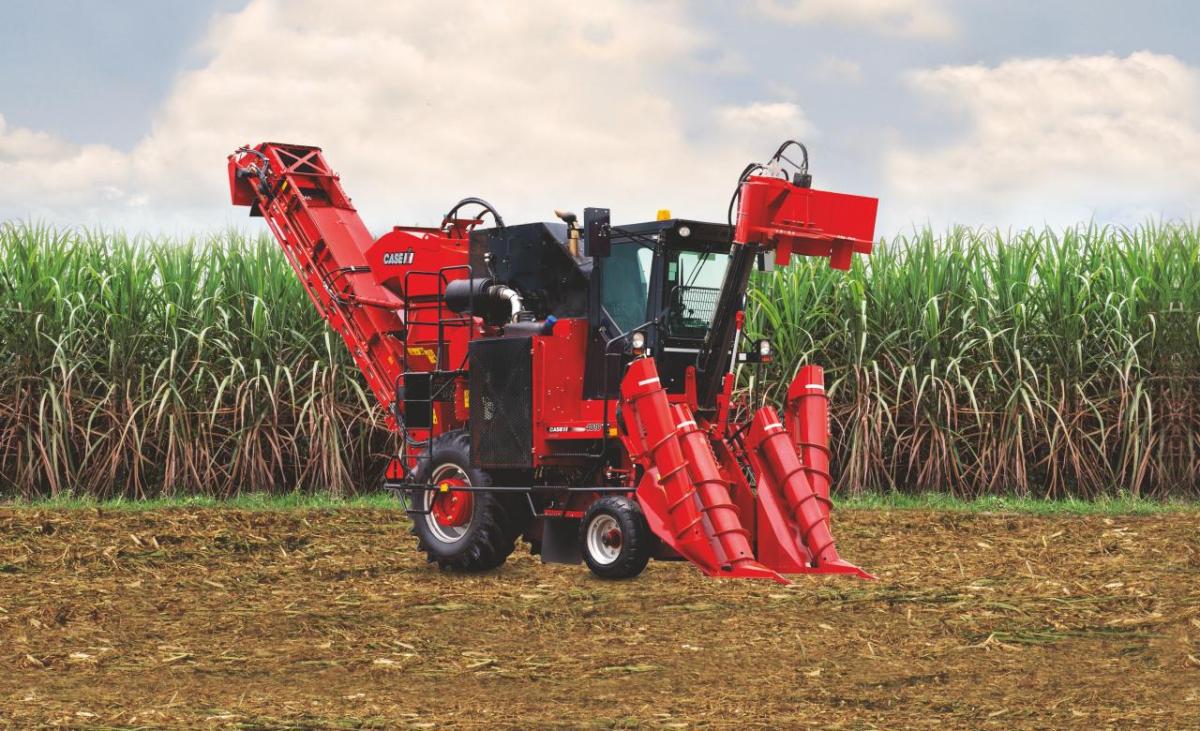Clik here to view.
 Image may be NSFW.
Image may be NSFW.Clik here to view.
 Image may be NSFW.
Image may be NSFW.Clik here to view.
 Image may be NSFW.
Image may be NSFW.Clik here to view.
 Image may be NSFW.
Image may be NSFW.Clik here to view.

In this exclusive interview, we speak with Narinder Mittal, President India, who oversees the company’s commercial, manufacturing, sourcing, and R&D operations in the country. With a focus on sustainability, we discuss CNH India’s strategic vision, upcoming initiatives, and innovative solutions for Crop Residue Management (CRM) - a critical factor in reducing environmental impact and improving soil health. We also explore how the agricultural sector can contribute to India’s ambitious ethanol blending goals, aligning with the government’s push for cleaner energy alternatives.
- Your position as President India, CNH, gives you responsibility for commercial outcomes for the Agriculture segment in India. How important is sustainability in your strategic plans?
At CNH India, sustainability is a core principle for us from manufacturing, sourcing to our entire business operations. We are also committed to promote environmental sustainability in the region by implementing advanced crop residue management technologies, promoting bioenergy production, and tackling stubble burning. We focus on baling crop residue for use in biofuels and power generation, in alignment with government initiatives, further supporting cleaner energy solutions and a circular economy. CNH enhances these efforts by actively engaging with farmers, encouraging sustainable practices, and collaborating with various stakeholders to ensure a balance between environmental responsibility and economic benefits.
- What CNH India initiatives are expected in 2025 for sustainability improvements?
At CNH India, we expect to expand our sustainability initiatives with a stronger focus on crop residue management that promotes renewable energy. Building on successful models like Kallar Majri in Punjab, we will likely scale up efforts to collect and bale crop residue across more states, helping to reduce burning and improve air quality. We will continue promoting this sustainable environment solution that entails converting crop residue into bales that are used to produce biogas, biofuels, and renewable energy, while supporting government initiatives like SATAT to establish bioenergy plants.
We are also looking forward to intensifying our “Sustainable Environment Solution” (SES) initiative, offering training to farmers on sustainable residue management methods and highlighting the economic benefits of selling residue for power generation. Collaborations with governments, NGOs, and agricultural organizations will be crucial in raising awareness and scaling these practices.
Furthermore, we will focus on advancing sustainability innovations, such as biochar production and precision agriculture technologies, to enhance soil health and optimize residue management. We will continue advocating for stronger crop residue management policies and work with governments to implement subsidies and incentives for sustainable practices. Through these initiatives, we aim to make significant strides in promoting environmental sustainability and contributing to a circular economy in the agricultural sector.
- What is Crop Residue Management (CRM) and how can it be leveraged to increase sustainability in the Agriculture sector?
Crop Residue Management (CRM) involves the proper handling and utilization of leftover crop residues, such as straw, stalks, and leaves, after harvest. Rather than being burned, which contributes to air pollution and loss of valuable organic matter, CRM offers sustainable alternatives like incorporating residues into the soil to improve its health, converting them into bioenergy, or using them for animal feed or compost. By reducing stubble burning, CRM helps prevent air pollution, while enhancing soil fertility by adding organic matter, improving water retention, and reducing the need for chemical fertilizers. Additionally, crop residues can be used as feedstock for bioenergy production, such as biogas and biofuels, contributing to cleaner energy solutions and reducing dependence on fossil fuels. CRM also offers economic benefits for farmers by providing an additional revenue stream through the sale of crop residues to industries that convert them into bio-based products or energy. This fosters a circular economy, turning agricultural waste into valuable resources and promoting sustainability across the agricultural sector. Through widespread adoption, CRM can significantly enhance sustainability, improve farm profitability, and help reduce the environmental impact of agriculture.
- Which CNH products could fulfil the need for more functional CRM processes?
CNH offers a comprehensive portfolio of products that support more functional and sustainable Crop Residue Management (CRM) processes, helping farmers reduce waste, improve soil health, and promote eco-friendly practices.
New Holland tractors provide the essential power and versatility to operate a variety of CRM equipment, including balers, rakes, mulchers, and choppers, enabling efficient collection and handling of crop residues. New Holland combine harvesters are designed for efficient multi-crop harvesting with minimal residue loss, ensuring that more biomass is available for reuse rather than being burned.
To manage residues post-harvest, CNH offers an extensive range of balers - large, small, square, and round - that compress crop residues into manageable bales. These bales can be used for bioenergy production, animal feed, or mulching, contributing to both environmental sustainability and economic value for farmers.
Additionally, equipment such as the New Holland Forage Harvester and Crop Chopper efficiently chop residues into smaller pieces for soil incorporation or feed, promoting residue recycling. Tools like Disc Mowers and Rakes further support the cutting and gathering of residues for easy collection.
For sugarcane farmers, the Case IH Sugarcane Harvester offers an effective CRM solution by enabling residue collection and minimizing environmental impact. These machines are pioneers in achieving sustainability with best-in-class fuel efficiency and one of the lowest carbon footprints in the industry.
A critical aspect of CRM in India is fodder harvesting. Despite India being the largest dairy market globally, low mechanization in fodder cultivation limits animal yield. CNH addresses this with the widest range of fodder harvesting solutions, providing an end-to-end mechanized approach for maize, fodder, and sugarcane, thereby supporting both the dairy industry and sustainable agriculture.
Our professional-grade multi-crop combine harvester - the first of its kind in India - supports diverse crop harvesting, making mechanical harvesting more viable and sustainable for farmers. Through this integrated product offering, CNH empowers farmers to adopt efficient, sustainable CRM practices while enhancing productivity and reducing environmental impact.
- According to the Press Information Bureau, Government of India,
‘An indicative target of 20% ethanol blending in petrol was initially set for 2030 under the EBP Programme. However, in 2020, the Cabinet Committee on Economic Affairs (CCEA) advanced this target to 2025, reflecting the government's commitment to accelerating ethanol usage.’ (Press Note Details: Press Information Bureau)
How can industries aid the efforts to reach sustainability goals in India?
One of the primary ways industries can contribute towards sustainable fuel use is by investing in infrastructure and technologies for ethanol production. This includes enhancing the capacity for converting crop residues and other biomass into ethanol. Industries can also support sustainable agriculture by providing advanced machinery such as balers, combine harvesters and fuel-efficient tractors to help farmers efficiently manage crop residues, which can then be used as feedstock for ethanol production. This helps reduce stubble burning, contributing to cleaner air and improved soil health, while also ensuring a steady supply of raw materials for ethanol production.
In addition to technological advancements, industries can play a key role in strengthening the ethanol supply chain. By collaborating with farmers, cooperatives, and bioenergy plants, industries can facilitate the collection, transportation, and processing of biomass for ethanol production. Furthermore, investing in research and innovation to improve the efficiency of ethanol production processes and exploring alternative feedstocks will drive cost reductions and improve scalability.
We recently collaborated with Indian Oil Corporation Limited (IOCL) to test oxygenated diesel (ED5 – 5% ethanol in diesel) in tractors. Currently in the testing phase, this innovative initiative addresses critical environmental challenges by reducing emissions while simultaneously enhancing energy security. By blending ethanol, a byproduct of sugarcane processing, with diesel, the project not only supports India’s agricultural sector but also reduces reliance on imported oil.
Industries can also help increase awareness and provide training to farmers on sustainable residue management practices, ensuring the long-term viability of the biofuel supply. By aligning with government initiatives such as the SATAT scheme and working in partnership with stakeholders, industries can help India meet its ethanol blending target and contribute to national sustainability goals.
Date and Time are ET. We may take up to two hours to approve confirmed content. Content is reviewed for publishing: Monday-Wednesday 8 a.m. -8 p.m. ET, Thursday-Friday 8 a.m. -6 p.m. ET